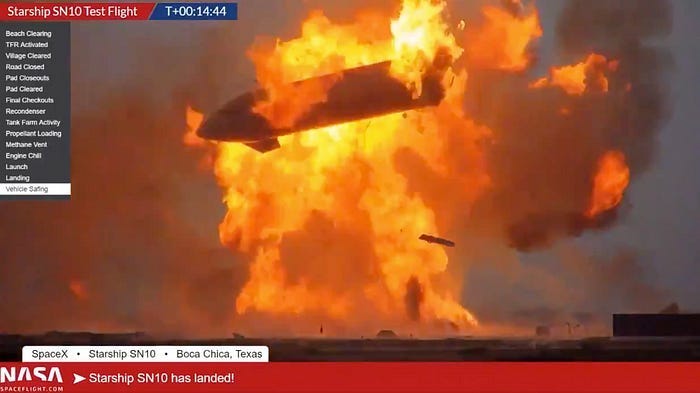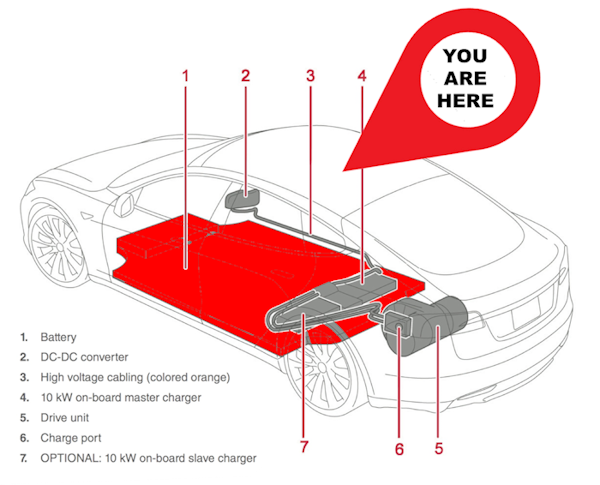I really wanted to love electric vehicles, but this technology does not make it very easy. My professional specialism is to understand and promote the exploitation of new technology. I spend my days understanding the benefits, identifying the harms that accompany these benefits and trying to separate the two.
I recently stumbled over yet another horrifying feature that once more makes electric technology very difficult to love.
In rocket science we’re always asking, what could go wrong? Professional rocket science is a risk averse game, and I have lost count of the number of times my reporting chain has warned me to be more careful. Always be ever more careful. No matter how careful you are, someone always suggests more care.
And quite rightly so. Mistakes can be very dangerous and very costly, and despite the current crop of trial and error development to entertain us, the proper approach is to avoid things blowing up in a terrifying fireball. One can indeed spin a detonation on the launch pad as one more vital step on the path to success, but in truth this explosion is a dismal failure.
So what can go wrong with an electric vehicle?
The big difference between a gasoline fuel tank and an electric battery is that the gasoline tank does not actually contain all of the chemistry required to drive the vehicle forwards. The other half is sucked in through the front, to be combined, pressurised and detonated to offer some motive power. That gasoline is relatively safe until combined with the oxygen in the air. But if it does ignite, it can be extinguished.
Alternatively, a fully charged electric battery contains all that it requires to drive the vehicle. This is why it is typically ten times heavier than the gasoline equivalent and encompasses much of the vehicle’s structure. Once it ignites, it can’t easily be extinguished.
You’re sitting on a huge bomb.
But a thermal runaway that leads to that vast battery combusting like a rocket motor is not the focus of this particular article. I have a different question.
What happens if a punctured battery doesn’t explode?
Should a damaged battery burst from the confines of its container and not immediately ignite, what happens? One would hope absolutely nothing, but with this technology we have no such luck.
According to some researchers and plenty of footage, a punctured battery may leak gas. Vast quantities of gas. These gasses are not only toxic, but unfortunately they are also inflammable. Professor Paul Christensen discusses this failure mode in this content.
According to this presentation, if a damaged battery does not explode, a whole new type of disaster unfolds. A punctured battery may leak inflammable gasses into a confined space, such as the garage next to your house or an underground car park. If you get a lung full of these gasses, you may be in trouble.
Meanwhile, the battery is heating very quickly indeed. Ultimately, the battery ignites the cloud of gas that it has produced. Perhaps the high temperatures encourage other electric vehicles nearby to do the same, in a chain reaction. Perhaps the pressure wave that results destroys the structure.
This failure could offer an outcome that may have much in common with a dust explosion or a fuel air mix thermobaric bomb. A dust explosion can cause major damage to structures, equipment, and people due to the extreme overpressure or shockwave effects. Flying objects and debris can cause further damage. Intense radiant heat from a fireball can ignite the surroundings, or cause severe skin burns in unprotected persons. In a tightly enclosed space, the sudden depletion of oxygen can cause asphyxiation.
That’s just great. Every time I try to love electric cars, I discover yet another lurking horror.
Acceptable Losses is not a strategy to technology adoption. As we are the one’s who must adopt this technology and incorporate it into our homes, is wanting to believe sufficient motivation?
Electric Dreams.
Our roads host a race to determine how the future will be powered, but only a single competitor may be permitted to finish. Everything will be electric, without exception. Electrical transmission is the carrier without equal. Batteries will provide storage, without question. Don’t ask questions.








